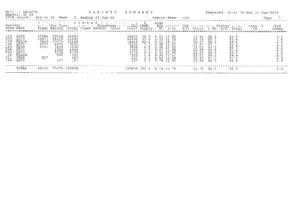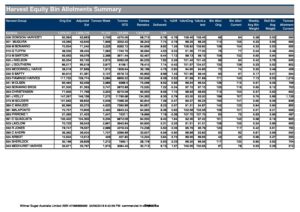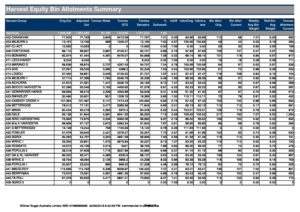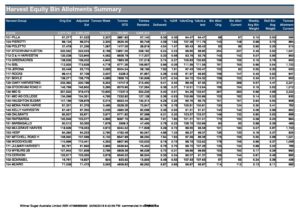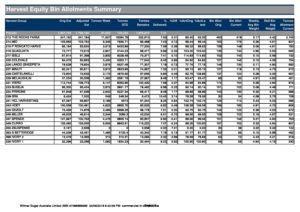Day: June 25, 2018
Wilmar – Burdekin Equity Summaries – Crush Week 2
SRA – Media Release
Prevention the best cure: RSD threatening commercial sugarcane crops
More ratoon stunting disease (RSD) is being found in commercial sugarcane crops and in nursery cane in 2018 than in previous years, which is raising concern among industry staff about the impact that this disease is having on the industry, according to Sugar Research Australia (SRA).
The disease causes significant economic losses but has no external symptoms. Because it is spread through diseased planting material and on machinery, this means that growers and contractors are reminded to maintain their vigilance against RSD with planting and harvesting in full swing in many areas.
RSD is one of Australia’s major sugarcane diseases and continues to cost the industry through lost production.
SRA Key Focus Area Leader for Biosecurity, Dr Andrew Ward, said that SRA’s RSD diagnostic lab is detecting more RSD in samples in 2018 than in previous years, including in cane that was to be used as planting material. He urges growers to arrange with their local productivity service organisation to have their planting material tested for RSD.
“Planting represents a significant expense for growers and disease-free planting material lays the foundation for high yielding crops,” Dr Ward said.
“Harvest is also a high-risk time for RSD to hitch a ride on machinery, spreading the disease between blocks, farms, and even districts.
“However, good farm hygiene can greatly reduce the risk. Cane knives, harvesters, plant cutters, planters and stool splitters should all be routinely sterilised between blocks on the same farm and between farms.
“Dirty machinery is risky machinery. If RSD infects a crop, yields will decrease and it can be a long and difficult process to reduce its impact. It is far easier to avoid the problem in the first place.”
Dr Ward added that recent improvements in the RSD test has revealed that the disease is more widespread in the industry than previously thought.
“This reinforces the need for stringent hygiene, as well as ensuring that planting material is being sourced from a clean source. Growers need to maintain close contact with their local productivity services organisation for sourcing RSD-free planting material.
NQ Dry Tropics Project
A Recent Article By NQ Dry Tropics
A project supporting Burdekin cane growers to reduce fertiliser use without affecting yield has so far prevented 116 tonnes of dissolved inorganic nitrogen (DIN) from entering waterways and impacting the Great Barrier Reef. A high level of DIN in water has been linked to outbreaks of crown of thorns starfish on the Reef, and also provides ideal conditions for weeds to thrive in rivers and wetlands, which reduces habitat for native fish and migratory birds. The reduction in fertiliser rates was achieved by 16 local growers who signed up to the pilot round of the Burdekin Tender project. The three-year project is funded by the Australian Government’s $225 million Reef Trust.
Under the project, growers proposed trialling ways to reduce fertiliser use – and put a price on the cost of making the change. Trials included matching fertiliser inputs to crop requirements and using technology to only apply fertiliser precisely where it is needed. The results from years one and two of the project were showcased at an event held at a cane property in Clare last week, attended by more than 30 local growers.
Grower Heath Salter from Clare who took part in the pilot round said, “We have reduced the amount of nitrogen applied on our farm by 20kg per hectare, whilst maintaining yield and saving money on fertiliser.”
NQ Dry Tropics’ Sugarcane Team Leader Luke Malan expressed pride at all of the growers’ achievements. “They still have another six months to go so we will see even better results by the end,” Mr Malan said. “What we didn’t expect is that these growers have pushed the limits of what is possible by going beyond their contracted reductions in fertiliser use without reducing their yield.”
“We now have an additional 25 Burdekin growers signed up to the project across a further two tender rounds that have been running since the pilot round launched in 2016. NQ Dry Tropics has worked closely with growers to develop tender applications and nutrient management plans. Extension partners Farmacist and Burdekin Productivity Services provide support to deliver and monitor the projects”, he said.
Monday, 25 June 2018
The July 2018 contract settled at:
12.05 US c/b
The Australian Dollar currently trades at:
74.30 US cents.
Forward indicative prices in Australian dollars are:
$363 for OCT Contract – 2018 season
$372 for 2018 season
$394 for 2019 season
$411 for 2020 season
Proudly brought to you by Kalagro.
Wilmar Daily Loading Advice
Loading Advice – 25th June 2018
Invicta 19 718
Kalamia 10 338
Pioneer 11 105
Inkerman 11 078
TOTAL 52 239
Kalagro Daily Fuel Price
Price effective Tuesday, 26th June 2018
DIESEL – $1.35810 including GST
UNLEADED – $1.34758 including GST
To place orders, please contact the Kalamia Cane Grower office.
